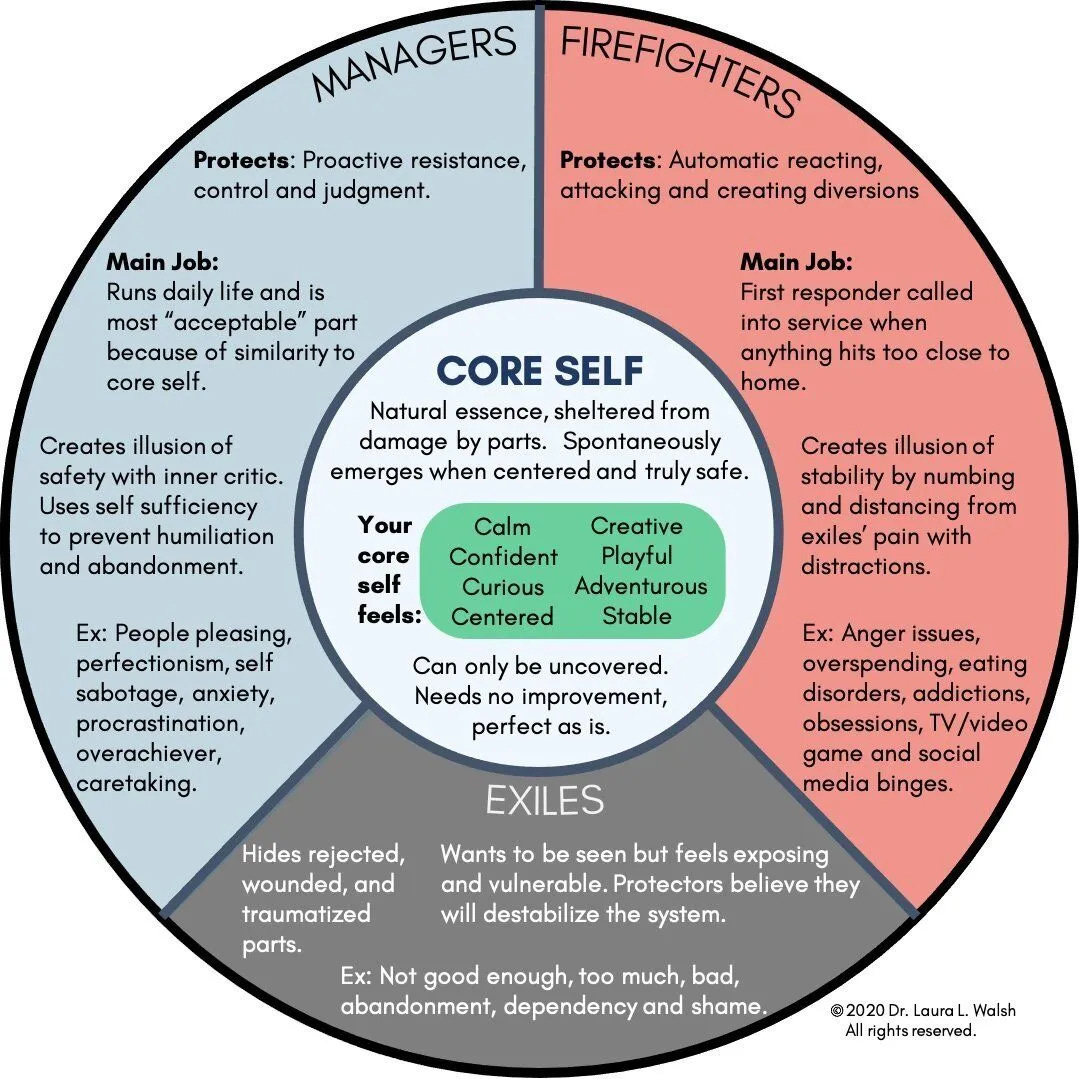Some Psychology for Responding To a World in Chaos
Using IFS and Parts Mapping to Improve Our Response
Our psyche longs for safety and certainty. We’ve biologically adapted to seeking them. So our minds create ways to respond when they are threatened or absent. These responses can manifest differently, depending on the person and their personal history. But there are general categories we all experience that are useful for understanding our response and possibly improving our response. This is especially important now, in light of how crazy the world is becoming.
I’ve found myself having all sorts of unwanted responses to 2025. My mind tends to gravitate towards avoidance and shutdown. Depression is often a close companion. While our minds might actually believe they are protecting us from danger, sometimes it’s really just protecting us from the perceived threat of emotional pain… and it does so not necessarily in the most productive ways. When these emotional defensive systems don’t work adequately, sometimes impulses even take over, leading to destructive behavior.
The Good News
There are ways of understanding how our minds respond to life, as well as ways to hack that system and make it work better. Internal Family Systems (IFS) is one such model. IFS is a therapeutic model developed by Richard Schwartz, based on the idea that we all have multiple internal “parts” or subpersonalities. Each of these parts has its own intentions, emotions, and ways of protecting us or reacting to the world.
You can look at the parts of yourself as your internal family. One member might be lazy, while another might be a go-getter. These two might not like each other, or get along. They might judge each other or even fight. This can create internal tensions and even hierarchies.
IFS tasks us with identifying these parts. Here are some broad categories in the model:
Identification of Parts
Managers: Protective parts that proactively manage situations and emotions to maintain control and safety.
Firefighters: Reactive parts that quickly act to reduce pain or emotional distress, often through impulsive behaviors.
Exiles: Vulnerable parts carrying emotional wounds or trauma, usually hidden or protected by managers and firefighters.
Self: The compassionate, curious, calm, clear, confident, courageous, creative, and connected center within the individual. The true Self is non-judgmental.
In essence, the goal of IFS is to allow the authentic self to be in the driver seat rather than the managers or the firefighters. To do that, we have to heal the exiles. The process involves mapping the parts and engaging with them to uncover what’s really under the surface.
Parts Mapping
Begin by inviting the “Self” energy into your awareness, gently evoking the eight qualities known as the 8C's: curiosity, creativity, compassion, calmness, courage, confidence, clarity, and connectedness. Allow yourself to settle into these qualities until you feel grounded and centered.
Once you sense this connection to your Self, gently invite your internal Parts to come forward. You may choose to focus inward and encourage Parts to appear in whatever order they prefer, particularly in relation to a specific question or issue you're exploring. Listen patiently as each Part fully expresses itself, paying close attention until it has shared everything it wants you to understand. Once finished, visualize that Part stepping aside or walking away, and then invite the next Part to present itself.
For each Part that emerges, you can guide your exploration using the IFS method known as the 6F’s:
First, find the Part by tuning into any thoughts, feelings, gestures, energies, or words associated with it, noticing where you sense it in your body. Next, Focus on this bodily sensation or element, seeing what additional insights arise. Then, Flesh it out by observing how the Part feels within your body, noting any emerging thoughts or emotions, estimating how close or far you feel from the Part, and sensing its approximate age. Continue by checking how you Feel toward this Part, ensuring you're engaging it from a place of Self energy and the 8C’s. Proceed to Befriend the Part by asking what it wants you to know, understanding its role, purpose, and perception of your age, as well as its own age. Lastly, explore the Part’s Fears by gently asking what it believes might happen if it stopped fulfilling its current role or behavior. Listen compassionately until the Part has fully shared its fears and concerns.
After interacting with each Part, reflect and consider asking additional supportive questions such as, “Are there other Parts that have concerns about this particular Part? What would need to happen for these Parts to trust you and one another more fully?” Throughout this process, document your insights, creating an IFS Parts Map by writing down the names of your Parts, their characteristics, roles, intentions, and how or when they manifest. This mapping can be as detailed as needed, providing clarity and facilitating deeper self-understanding and integration.
Healing!
I have found in the past that there are parts of myself I don’t like. This model turns that on its head. Like being lazy or depressed… these are parts of myself that are attempting to serve a purpose. They may be managers. The lazy guy wants to protect me from stress and the emotional pain associated with that. Going deeper, it might come down to an Exile who is afraid of rejection, or has shame. The healing comes when you can dig down that deep to the part of yourself… maybe a little boy or girl, who is afraid, vulnerable or otherwise miserable. Healing is when that part of you unloads the burden they’ve been carrying since childhood.
Like many people, I just didn’t know this is what my mind was doing. I created systems of protection that served me for years. But as the world has gone crazy and I’ve questioned many of my long-held assumptions, things have come to the surface. The protection systems are failing me. The good news is this process of parts mapping can help uncover that authentic Self.
Responding to the World As Our Authentic Self
Imagine responding to a chaotic world with curiosity, creativity, compassion, calmness, courage, confidence, clarity, and connectedness… rather than as a scared child or the protective systems we’ve built to protect the scared child. That’s the authentic self. It’s always within us, with no need of improvement… only uncovering.
If you are struggling with your response to things, and feel stuck, give this process a shot. There are a lot of resources online to help… or seek a licensed therapist who uses IFS therapy.
As always, thanks for reading. I do hope this is helpful in the context of facing collapse. Understanding the psychological part is just as important as prepping or activism… especially if we are frozen in inaction. Cheers.







This was an interesting thing to find on Substack, I was following the thread of a restack of another essay about not fussing over the fall of the American Empire. Which is easy to say for some, and might overlook a lot of others. But I'm happy to see any reference to Dick Schwartz here, my exploring IFS with a therapist has not been the most helpful part of my recovery from Trauma but it's very insightful and has informed the other work that I've been doing. I got a lot out of the Parts book, especially the audio version. It's worth noting that the last year of this work for me has been far, far more helpful than the 30 previous years of psychiatric 'help' for addiction, bipolar 1, an eating disorder, and more. I'm on way less medication and more stable yet I could provide a list of the harmful interactions I've had with men and women who actually went to medical school, most have been less than helpful at best.
Really timely and important advice. Gratitude. 🙏